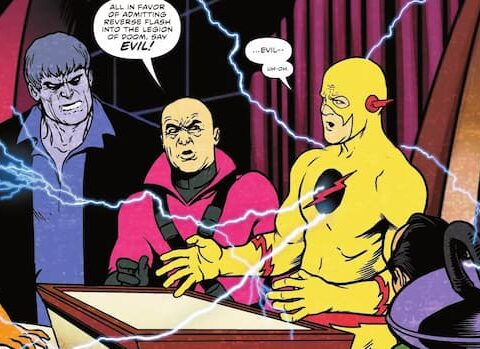Yes, we’re going there. Why not?
You know, I was kind of wondering if some anti Trump people would turn suspicious about the results if the Great Orange One won this 2024 election.
Obviously not as widely, as rabidly or as aggressively as the MAGA/Q-Anon army did in 2020.
Unlike Trump, Stone, Giuliani and co in 2020, the Democrats haven’t said a single word thus far to imply an illegitimate election outcome.
But I was curious to see if upset Democrat voters would resort to allegations of foul play the same way the Trump supporters did four years ago.
Well, some have. And the argument seems to be growing.
But, unlike with the Trump supporters from 2020, it wasn’t immediately: it’s been gradual and fairly muted at first, unlike the prefabricated and organised election denial that Trump spearheaded in 2020 as an actual strategy.
This current conspiracy theory has been gathering traction online since last week’s voting.
At first, I was a little ambivalent about it: partly because I was already sick of the whole subject of Trump, the Democrats and the election in general.
But the more I’ve sat with it, the more I wonder if there’s something to be considered. Not that I’m stating that the election was definitely rigged: just that there are significant things to consider.
The most conspicuous things to look at for me are something Donald Trump said and something that was said in regard to Elon Musk – both of which are very suspicious.
But let’s examine the more generalised case first.
The central factor in some people’s doubts is the sheer scale of Trump’s win: which doesn’t tally at all with the various polls and predictions.
If you were following the election, you’ll recall that polls and data overwhelmingly had Harris and Trump either neck and neck, too close to call, or had the Democrats slightly ahead.

CNN here, for example, portrays the closest electoral college vote on record.
I’m not sure polls and predictions are very reliable, generally speaking: this wouldn’t be the first time in recent years that the so-called experts or the data analysts have been completely off in their forecasts.
So this alone, while curious, probably isn’t enough to suggest a conspiracy.
Though the sight of some experts throwing their hands up and looking confused after the results were announced did add some fuel to the fire.
In several cases, I saw clips of pollsters – particularly one who was interviewed by Piers Morgan – looking bewildered and saying they don’t understand how their data turned out to be so wrong.
They stop short of suggesting a conspiratorial explanation.
But some of those experts were particularly surprised by the outcome in the context of how poorly Trump was campaigning in recent weeks. Trump’s rallies had been dull and often incoherent, with repetitive diatribes and all kinds of baffling ramblings about ‘the late, great Hannibal Lecter’, etc.
But people always underestimate how loyal Trump’s support is: there’s literally nothing he can do to lose votes – this has been clear for years now.
Something like that horrific Madison Square Garden rally a week before the vote would’ve sunk any other candidate. But Trump is not any candidate – and the analysis always needs to account for that.
Others have argued that the maths doesn’t add up.
There’s talk of a ‘missing’ 18 million votes, and questions about why there was such a drop in votes for Kamala Harris compared to Joe Biden four years earlier.
The best explanation for those issues would be a simple case of an underwhelming campaign by Harris and the Dems and an increased level of voter apathy this time around.
But the counter argument to this is, again, what was being reported beforehand – or at least the impression that was being created: that this was shaping up to be a huge voter turnout.

The idea of the massive turnout was being reported even on election day itself: whether this was true or not is hard to know.
But the substantial reduction of votes for the Democrats appeared to contradict this. And this wasn’t a case of all those people switching to Trump and the Republican Party – because the Republican vote appears to have been more or less the same numbers as 2020.
Which, again, could simply be a case of a weak campaign by the Dems.
But given the context of all the talk of this being ‘the most important election ever’ and media claims of a ‘historic turnout’, it’s curious that the drop in votes from Biden to Harris was apparently so significant.
And why was everyone being told the voter turnout was notably high, if the results suggest it was low relative to the previous election?
More curious than this, in some cases where Democrat candidates won the Senate, Trump still won the state itself. Which is an odd disparity.
As ABC explains, for example. ‘As the dust begins to settle on the 2024 election, one eye-opening result has been the number of split-ticket outcomes in states between their presidential and U.S. Senate races. Across the 2016 and 2020 presidential elections, just one state — Maine in 2020 — didn’t vote for the same party for both offices when both were on the ballot at the same time. But 2024 appears set to have at least three split-ticket outcomes, and most likely four as things stand…‘
The article adds, ‘Don’t be fooled, though — split-ticket voting is still rare.’
Parallel to these questions, there has been some suspicion about how early some of the states were called or settled.
This was actually something I noticed too on election night: results that usually take a lot longer to count or declare were actually settled very early compared to previous elections.
I tend to do the overnight watch of live election night coverage for most election years: and I have to admit, there was something noticeable about how quickly and efficiently states were declaring this time.
Again, the commentary beforehand was all predicting how the vote counts would be carrying on without clear resolution potentially for days.
The fact that the election was pretty much considered settled within about five hours was surprising – and again, at odds with the kind of contest all the pre-election data was predicting.
Something felt off about it.
In fact, this vote count seemed to go precisely how Trump had said he’d wanted the previous election to go: specifically that results should be declared early and decisively, and that no more vote counting should be going on passed the election date.
Remember ‘Stop the Count’ from 2020? That’s what that was about.
It has been noted that the key state of Georgia was declared surprisingly early this time. This being despite bomb threats and subsequent disruption that should’ve meant, in theory, a delay.
The bomb threats were in several states actually, and seemed to primarily target polling locations with high Democrat turnout expected. The hoax threats were blamed (spuriously?) on Russia.
But really, most of the results seemed to be announced sooner than expected.
There are also various claims online by people saying their votes didn’t register, or that they received no confirmation of their vote, and things like that. But, as with all the dubious anecdotal claims by disgruntled Trump supporters in 2020, it’s difficult to know how much of this is true or not.
None of this that we’ve discussed so far is proof or indication of any foul play.
But all of that is noted here in order to explain the atmosphere of mistrust that has set in among doubters – and the general sense that something is amiss with how things have played out.
Long-time conspiracy author Wayne Madsen expressed his scepticism earlier than most, via Threads, writing ‘I spent my early career in computer security for the Navy and NSA. I’m beginning to believe our election was massively hacked just like happened a few weeks ago in the Republic of Georgia. Think Elon Musk, StarLink, Peter Thiel, Bannon, Flynn and Putin. 20 million Democratic votes don’t disappear on their own…’
But now let’s get to some of the more interesting elements.
To start with, does anyone remember the very curious thing Donald Trump said at a rally a week before the vote?
Well, the Internet hasn’t forgotten it.
At the rally in Madison Square Garden – the same horror show that caused so much uproar for other reasons – Trump said a very odd thing: he said, ‘We can take the Senate pretty easily, and I think with our little secret we are gonna do really well with the House. Our little secret is having a big impact,’ he said, gesturing at Republican House speaker Mike Johnson. ‘He and I have a little secret – we will tell you what it is when the race is over…‘
Why did he say that? And what did it mean? What was the ‘little secret’?
There hasn’t been any explanation for that statement. Mike Johnson was asked about it and simply replied that ‘a secret is not meant to be shared‘.
It’s funny that the media was so upset about the comedian’s Puerto Rico joke, but didn’t really bother to be concerned about this far more important thing that Trump had said.
What did he mean?
There’s also the strange thing he’s said at several events about not needing votes: which is a really weird thing for a candidate to say.
He was saying it at rallies in October: but actually he was saying it as early as last year. As this Business Insider article from October last year reported, for example, ‘Former President Donald Trump told supporters at a New Hampshire rally that they don’t need to vote on election day next year… “You don’t have to vote, don’t worry about voting. The voting, we got plenty of votes, you gotta watch“…’
The thing about Trump is that he’s very loose-lipped. He’s not good at keeping secrets: more often than not, he’ll say the quiet part out loud. He likes to boast about things before they’ve even happened.

Was that what happened here? If so, it’s not unlike him bragging that ‘all hell is about to break loose‘ in the hours before the July 13th assassination psy-op.
He just can’t help but blurt things out during his rambling tirades.
Until someone asks him what he meant by that exchange in New York and he explains it, I think there’s some cause for suspicion.
Let’s keep going.
A lot of the so-called ‘left-wing conspiracy theorists’ (‘BlueAnon’ is an unfortunate phrase now being thrown around) have pointed to the conspicuous presence of Elon Musk in the equation.
The theory that seems to have taken root is that Musk somehow hacked voting machines via his Starlink satellites.
Obviously I wouldn’t put such machinations past him, as Musk essentially appears to be a real-world Lex Luthor and that’s exactly the sort of thing Lex Luthor would do.
But, as far as can be ascertained, the Starlink technology shouldn’t be able to compromise the voting machines, particularly as the machines are not connected to the Internet.
At least, that’s what we’re told.
Obviously, I’m not naive enough to think those machines couldn’t be manipulated or hacked via other undisclosed technologies or methods: and if there’s someone you’d think might be capable of some technical manipulation, Elon Musk would be high on that list.
Could that even be why Trump and Elon got together for this election?
But again, as far as we officially know, Starlink isn’t capable of hacking into the voting machines.
But we’re not done with Elon yet.
Because the thing that I really think is worth noticing is what Joe Rogan said on a podcast after the election.
Rogan, who interviewed both Trump and Elon Musk in the days leading up to November 5th (and who even got a name check in Trump’s victory speech for his perceived part in the victory), told Theo Von that he had been in regular contact with Musk – and said that Musk claimed to have known the election results ‘four hours’ in advance of any announcements.
How would Elon have known results before vote-counts had even finished?
More specifically, Rogan said that Musk had ‘an app’ that allowed him to know this.
The nature or name of this app isn’t specified.
But Musk was sat next to Trump for much of election night, as the videos showed. Who wouldn’t love to have been a fly on the wall to listen in to that conversation as the night unfolded?
What ‘app’ does Elon Musk have that allowed him to know results four hours in advance?
By definition, it has to be an app that is able to access data it’s not supposed to be accessing, no?
So why has no one asked him about this? I mean, the claim is out there now in the public domain – so why the silence and lack of follow-up?
To be clear, Joe Rogan wasn’t trying to expose Musk by sharing this: if anything, Rogan has broadly been on Musk’s and Trump’s side in this election. It’s more likely that he let something slip in his podcast that he wasn’t meant to – which isn’t surprising, as Rogan’s podcast conversations are very loose and free-flowing, and he’s often smoked weed before or during the show.
This spectre of Elon Musk’s ‘app’ and his apparent foreknowledge of results is every bit as curious as Trump’s unexplained riffing abut his ‘little secret’ at the New York rally.
It’s these two tidbits that have me the most curious about the nature or reality of Trump’s apparent mega victory.
I’m not committed to arguing that this election was hacked or fixed – not definitively anyway.
And I never at all believed that the 2020 election was ‘stolen’ either.
But I would suggest there might be as much cause for suspicion about this 2024 vote count than there ever was about 2020.
The key difference here is that the Democrats are not raising the issue at all: whereas Trump and those around him were tactically talking about a rigged election long before the 2020 voting even happened – because the election denial route was a prefabricated strategy in the event of defeat.
In reality, the Republican claims of a fraudulent election in 2020 seemed to center on complaints about the high number of mail-in ballots: though this was already explained as being a consequence of the COVID business, as well as the Democrats encouraging people to vote early.
Interestingly, the most telling part of Trump’s Joe Rogan interview just before this last election was to watch how much Rogan pushed the president to back up his long-standing claims of 2020 election fraud by the opposition.
No matter how many times Rogan tried to get Trump to make the case, the president floundered, unable to present a coherent explanation.
In the end, Trump resorted to an empty promise to come back on the show another time and bring the evidence to show him. But you’d think that by now – after four years of talking about it – Trump would have the ‘evidence’ committed to memory.
But, getting back to this 2024 election: an obvious follow-on question would be why the opposition isn’t raising any concerns publicly?
Well, there’s two things to consider there.
First, the Democrats are tactically inept – we’ve seen that over and over again. The last decade or so, from the corrupt suppression of the Bernie Sanders campaign onwards, the DNC has been a total shit show.
Which is either monumental incompetence: or is by design. I don’t know which.
Second, it’s possible they don’t want to be seen to engage in the same election denial that Trump and the Republicans did in 2020, especially after they’ve spent four years condemning the other side for not respecting the democratic process or the peaceful transition of power.
Both parties know they’re part of a corrupted and compromised system: it just seems to be that the Democrats are always reluctant to draw public attention to that reality, whereas the Trump-era Republicans are willing to call it out – but only so that they can portray the other side exclusively as the corrupt entity while pretending *their* side is the side of the angels.
More than that, there’s always the sense that most of this stuff is manufactured theater anyway – up to and including the embarrassing mainstream media meltdowns in the wake of Trump’s victory.
If the Democrats, the government institutions, and the mainstream media, were willing to go along with something like the July 13th assassination hoax – which itself was clearly designed to help Trump win a second term – then it’s no stretch to think they’d stay quiet about any suspicions about the election result.

Four more years of Trump, for one thing, means four years more of content-fodder and better ratings for those same broadcasters and networks that act as if they’re outraged by Trump’s victory.
All the embarrassing post-election media posturing about being ‘the Resistance’ for the next four years is some of the most stomach-turning bullshit you’ll ever see.
They would much rather continue the culture wars and the righteous indignation routines than actually investigate conspiracy or corruption.
Is it all just inflated theater and roleplaying?
And that’s being generous too – by assuming that the media isn’t in on any possible election fraud cover-up.
So, what do we conclude here?
Was this election rigged? It’s certainly possible.
It’s also very true that the Democrats ran a poor campaign, preceded by an unedifying Biden to Harris swap-out. And that, for all his weak-points, Trump was just too big to fail.
American culture in particular is obsessed with entertainment and celebrity: and Donald Trump is a very entertaining celebrity. Combined with the cult-like loyalty of the preexisting MAGA support base, it’s feasible that Trump simply maintained his prior level of support while adding enough new support.
And that the Democrats and the liberal media outlets manufactured such a false sense of momentum for the Harris campaign that they – and their supporters – bought into their own false reality too much.
And were thus shocked and confused by the actual results.
I said in a post prior to the election that this was all feeling very much like déjà vu: too reminiscent of the 2016 dynamics.
The subsequent sense of shock, as well as the embarrassing media meltdowns, are all an exact replay of 2016.
America seems to be stuck in a loop.
What will be interesting to watch for, between now and the handover of power in a few months, is whether any Democrats or any public officials begin to raise any concerns or questions about the integrity of the election.
I doubt they will. I think it would’ve started to happen already. But we’ll see.
The two key things for me though are still, (1) What did Trump mean about not needing the votes?, and (2) What ‘app’ allowed Elon Musk to know the voting results hours before they were announced?
You would think authorities would be interested in those questions too. So far, it’s all quiet, however.




